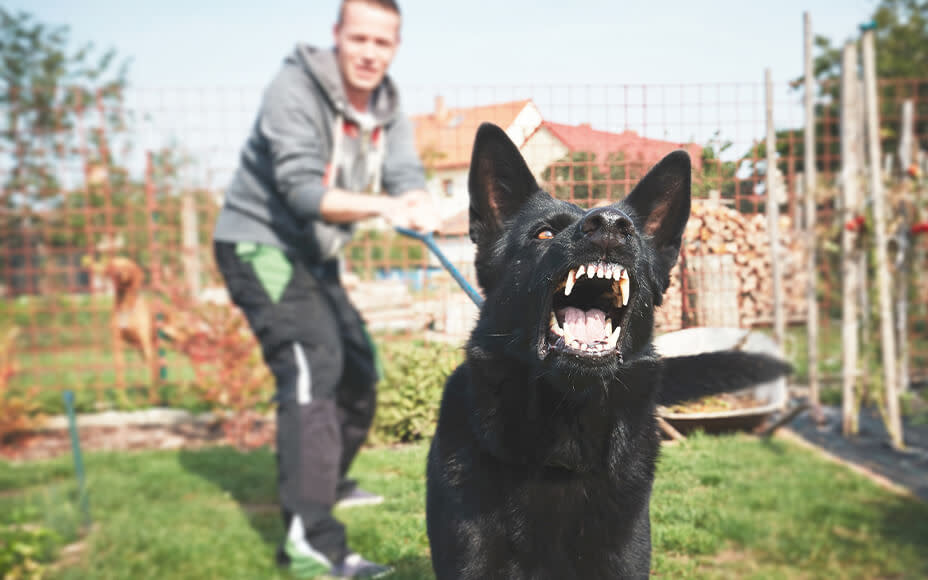Your dog barks incessantly, and you’re not sure why or how to stop it? Excessive barking can have various causes. Learn why your dog barks a lot and what you can do about it.
Barking is normal, but when is it too much?
First of all, barking in dogs is normal. It’s part of communication, just like growling, wagging their tails, and licking your hands. However, some dogs are very relaxed and naturally bark less. On the other hand, there are those that you can hear from afar and are real barkers. The reasons for this can vary. Some dogs are predisposed to bark more and are more sensitive to stimuli. Breeds with a strong guarding instinct, for example, react to noises as it is in their genes.
It is essential, however, to distinguish: Do the dogs bark and can they be easily stopped or calmed down by their owners, or do they escalate uncontrollably? Does your dog bark at other dogs, people, bicycles, children, etc., or does he just “let you know” when he sees or hears something unusual? So, it is always important to look at why your dog barks and whether you can “control” the barking. If your dog cannot be calmed down by you or does not understand that he should stop, then it is too much. The same applies if your dog continues to escalate and ends up overexcited or even becomes aggressive.

The cause: Why do dogs bark?
To stop your dog from barking, it is crucial, in the first step, to find out why he barks so much. The reasons for barking can be various, but the training approach should always be tailored to the cause.
Possible causes for frequent barking in dogs include:
- Stress, Uncertainty, and/or Fear: Barking at encounters with other dogs, other people, bicycles, noises, visitors.
- Frustration: Barking at the sight of other dogs, waiting somewhere for a long time, throwing toys.
- Boredom: Barking while lying in the basket, being ignored, talking on the phone.
- Joy: Barking during play, petting, receiving visitors, coming home.
- “Letting you know”: Barking at the mailman, neighbors, noises, doorbell ringing, knocking.
- Illness: Barking in stressful situations, during contact with other dogs, being touched.
As mentioned earlier, barking is innate for some dogs. Some bark to alert you to someone unfamiliar in your territory, while others bark to draw attention to wildlife, often found in hunting dog breeds. It is important not to try to suppress barking in these cases, as it goes against the natural disposition of these breeds. In such cases, it is essential to learn to guide the dogs better and “control” their barking.

The appropriate training approach
What you see is often not the cause of your dog’s barking. This means: What you might see is that your dog always barks at other dogs during walks. However, the cause of the increased barking is not the other dog itself but perhaps that your dog is insecure around other dogs and barks to keep them at a distance. Maybe he had bad experiences with other dogs in the past and learned that he can keep others at a distance by barking.
Therefore, you should work on making your dog more confident around other dogs and gaining more self-assurance. This can be achieved, for example, by ensuring positive experiences with other dogs and leading him confidently and safely past other dogs.
You can see that the topic is quite profound and requires a good understanding of dogs to determine why your dog barks so much and what an appropriate approach would be. It is best to contact a dog trainer and have them assess the situation. By being “live on the spot,” professionals can tell you exactly why your dog barks so much and how you can train him to stop.
How can I train my dog to stop barking?
Once you have identified the cause of your dog’s excessive barking, you can start training. Below, we provide possible approaches on how to train your dog to stop barking. However, we recommend seeking advice from dog trainers, as the causes are very individual, and training approaches can vary greatly.
Errors in dog training can occur but can also worsen behaviors. They are best avoided by knowing exactly how to work with your dog.
In Uncertainty and/or Fear:
If your four-legged friend barks out of fear and/or uncertainty, you should work on building confidence and learn how to safely guide your dog through challenging situations. Gradually reducing “fear triggers,” such as associating encounters with big men with positive emotions, like “the man gives me treats,” can also be helpful.
The association with something positive can be highly effective in dog training. Many dogs are quite food-driven and will appreciate a tasty reward—even if it comes from a scary person they might want to bark at.
In Frustration:
Dogs that bark a lot out of frustration, perhaps because you put away their favorite toy or chatted with your friend on the street for too long while your furry friend wants to move on, need to learn to tolerate frustration. You can practice this by exposing your dog, in a tailored manner, to frustrating situations repeatedly. Reward calm, relaxed behavior that doesn’t get your dog more worked up.
In Boredom:
Dogs that bark because they are now supposed to lie in their place and no one is paying attention to them may not have learned to tolerate boredom. This is why calmness training is one of the first things you should practice when your four-legged friend moves in with you. Send your dog to his place several times a day and simply ignore him. Avoid looking at him, touching him, or speaking to him during these times.

In Joy:
If your dog barks out of joy, that’s not necessarily a bad thing. However, it’s crucial to distinguish whether your dog is at an acceptable excitement level or if he’s getting overly worked up, turning joy into excessive excitement. In such cases, take your dog aside and wait until he calms down. Only then should he receive attention and/or his coveted object, like his toy. This teaches him that he achieves his goal with calm behavior.
When “Letting You Know”:
If your dog loudly comments on the mailman or doorbell ringing, it might not be pleasant. However, “letting you know” is essential for many dogs and shouldn’t be completely suppressed. Instead, teach your dog that when the doorbell rings, he should go to his place and wait until you fetch him to greet the visitor. If your dog comments on everything he hears, he might feel responsible for the “safety” of your family. In this case, work on relieving him of this duty and make it clear that he can relax at home, and you have everything under control.
Due to Illness:
Barking due to illness or injury usually occurs quite suddenly and is accompanied by other behavioral changes. If your dog, for example, avoids being touched by you or others or appears nervous, anxious, or restless, you should have it checked by a veterinarian.
Punishing a Barking Dog? Anti-Bark Collars, Water Bottles, etc.:
When your dog starts barking like crazy, a stern “No, stop that!” or other reprimands are usually our initial reaction. However, it’s crucial not to punish your dog outright for barking. Methods like anti-bark collars, spray bottles, throwing keys, shouting at the dog, or pinching are approaches you should steer clear of as they go against the principles of species-appropriate care. In most cases, these methods only address the symptoms and not the root cause of barking—and may, in the worst case, damage the trust between you and your dog. Spraying water may stop the barking, and your dog might even learn that barking leads to being sprayed and might avoid it out of fear. Remember that measures based on fear are not humane and should be avoided.
If your dog barked out of uncertainty, he won’t learn that everything is okay and that he can relax. Working on the cause is not addressed in such training. Training through punishment can also lead to a momentary sense of achievement, which is not sustainable. Sometimes, behaviors worsen, or new problems arise, such as your dog developing a fear of water.
If you’re unsure, always seek the guidance of a trainer whose training approaches you feel comfortable with, and where both you and your dog feel well-supported. Some trainers also offer online supervision.


